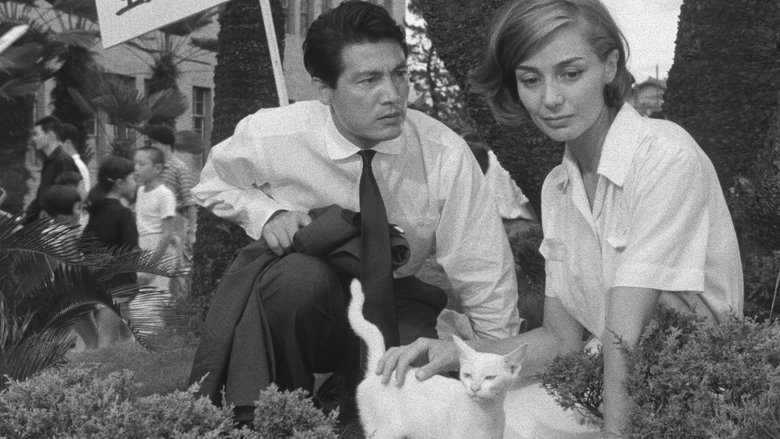← Back to Reviews

in

Hiroshima Mon Amour, 1959
In the city of Hiroshima, a french actress (Emmanuelle Riva) has an affair with a Japanese man (Eiji Okada) while she is in Japan to film a movie. As they grapple with their attraction and the necessarily short-lived nature of their relationship, the actress opens up about a traumatic experience she had during the War.
Some films leave you with the feeling that nothing you can say or write about them will be anywhere adequate to the experience. And, at the same time, a sense that maybe you don't totally "get" the film. Such it is for me and Hiroshima Mon Amour.
What I feel most strongly able to articulate about what I took from the film is the complex role that past experiences play with present ones. The actress has been marked, powerfully, by her experiences during the war as a young woman who fell in love with an occupying German soldier. Feelings of love and passion open up those memories and experiences, and she does not get to choose whether or not the bad comes with the good. The more wonderful her experiences with her Japanese lover, the more painfully she must reckon with the loss of her German one.
The sequence in which the actress slowly unfolds the story of her young love is spectacular. You come to understand why she would be so drawn to and captivated by Hiroshima, a place of destruction and survival, and anger that cannot find a target. There is such a complexity of emotions bound up in her memories, specific moments and vague memories. You can understand why it would be tempting for her to unburden herself to a stranger, to a person who has also experienced loss and suffering that can have no real resolution.
The visuals are stunning, opening with a sequence of entangled bodies covered in ash. It might be seen as a precarious thing to compare a person's personal experience to the bombing of Hiroshima, but the film is so subjective and tangled in the actress's memories, that it doesn't feel like a tasteless comparison so much as a way to reflect her anguish. The movie's use of flashbacks and a moving camera also put you into that highly subjective space.
The film is definitely skewed very strongly toward the point of view of the actress. I would have wanted to know more about the experiences and feelings of the architect. That said, the film is convincing in showing the chemistry and emotion between the two of them to the point that you entirely believe why it would bring up such a well of emotion in her, and why he would persist in pursuing her despite her erratic state of mind.
A really lovely film that already begs a rewatch for deeper understanding.

Hiroshima Mon Amour, 1959
In the city of Hiroshima, a french actress (Emmanuelle Riva) has an affair with a Japanese man (Eiji Okada) while she is in Japan to film a movie. As they grapple with their attraction and the necessarily short-lived nature of their relationship, the actress opens up about a traumatic experience she had during the War.
Some films leave you with the feeling that nothing you can say or write about them will be anywhere adequate to the experience. And, at the same time, a sense that maybe you don't totally "get" the film. Such it is for me and Hiroshima Mon Amour.
What I feel most strongly able to articulate about what I took from the film is the complex role that past experiences play with present ones. The actress has been marked, powerfully, by her experiences during the war as a young woman who fell in love with an occupying German soldier. Feelings of love and passion open up those memories and experiences, and she does not get to choose whether or not the bad comes with the good. The more wonderful her experiences with her Japanese lover, the more painfully she must reckon with the loss of her German one.
The sequence in which the actress slowly unfolds the story of her young love is spectacular. You come to understand why she would be so drawn to and captivated by Hiroshima, a place of destruction and survival, and anger that cannot find a target. There is such a complexity of emotions bound up in her memories, specific moments and vague memories. You can understand why it would be tempting for her to unburden herself to a stranger, to a person who has also experienced loss and suffering that can have no real resolution.
The visuals are stunning, opening with a sequence of entangled bodies covered in ash. It might be seen as a precarious thing to compare a person's personal experience to the bombing of Hiroshima, but the film is so subjective and tangled in the actress's memories, that it doesn't feel like a tasteless comparison so much as a way to reflect her anguish. The movie's use of flashbacks and a moving camera also put you into that highly subjective space.
The film is definitely skewed very strongly toward the point of view of the actress. I would have wanted to know more about the experiences and feelings of the architect. That said, the film is convincing in showing the chemistry and emotion between the two of them to the point that you entirely believe why it would bring up such a well of emotion in her, and why he would persist in pursuing her despite her erratic state of mind.
A really lovely film that already begs a rewatch for deeper understanding.
